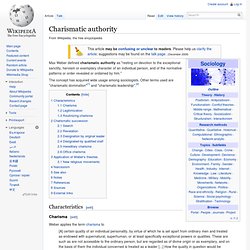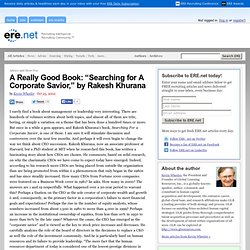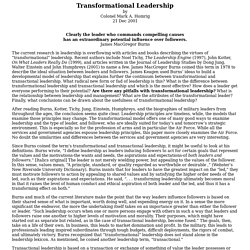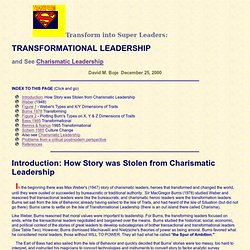

Sign In. Charismatic authority. Max Weber defined charismatic authority as "resting on devotion to the exceptional sanctity, heroism or exemplary character of an individual person, and of the normative patterns or order revealed or ordained by him.

" The concept has acquired wide usage among sociologists. Other terms used are "charismatic domination"[1] and "charismatic leadership".[2] Characteristics[edit] Charisma[edit] Weber applies the term charisma to [A] certain quality of an individual personality, by virtue of which he is set apart from ordinary men and treated as endowed with supernatural, superhuman, or at least specifically exceptional powers or qualities.
Legitimization[edit] Charismatic authority is [P]ower legitimized on the basis of a leader's exceptional personal qualities or the demonstration of extraordinary insight and accomplishment, which inspire loyalty and obedience from followers.[4] Leadership is the power to diffuse a positive energy and a sense of greatness Routinizing charisma[edit] Le charisme en politique : idée séduisante ou concept pertinent ? 1Commençons par deux affirmations : le concept sociologique de charisme, utilisé pour l'analyse de formes de domination, n'a pas sa place dans une histoire de la séduction ; la séduction n'est pas l'élément central d'une configuration charismatique.

Contester d'emblée l'existence d'un lien utile entre le charisme en politique et une histoire de la séduction me semble une précaution nécessaire pour éviter toute confusion entre ces deux termes. 1 Helmuth Plessner, Die verspätete Nation. Über die politische Verführbarkeit bürgerlichen Geistes. (...) 2Car celui de séduction est souvent appliqué au champ politique. On parle ainsi couramment des masses séduites. 2 Gustave Le Bon, La Psychologie des foules (1re ed. 1895), Paris, 1963, p. 28. […] le type du héros cher aux foules aura toujours la structure d'un César. 3En politique, la séduction, comme technique, vise à la fois des individus, des groupes et la masse. 3 Serge Moscovici, L'Âge des foules.
On Charisma and Institution Building, Weber, Eisenstadt. A Really Good Book: “Searching for A Corporate Savior,” by Rakesh Khurana. I rarely find a book about management or leadership very interesting.

There are hundreds of volumes written about both topics, and almost all of them are trite, boring, or simply a variation on a theme that has been done a hundred times or more. But once in a while a gem appears, and Rakesh Khurana’s book, Searching For a Corporate Savior, is one of those. I am sure it will stimulate discussion and controversy over the next few months. And perhaps it will even begin to change the way we think about CEO succession. Rakesh Khurana, now an associate professor at Harvard, but a PhD student at MIT when he researched this book, has written a fascinating story about how CEOs are chosen. Bass_transforrmational_leadership.
ETHICS,%20MORAL%20CHARACTER%20AND%20AUTHENTIC%20TRANSFORMATIONAL%20LEADERSHIP. Transformational Leadership. Transformational Leadership by Colonel Mark A.

Homrig 21 Dec 2001 Clearly the leader who commands compelling causes has an extraordinary potential influence over followers. James MacGregor Burns The current research in leadership is overflowing with articles and books describing the virtues of “transformational” leadership. Recent authors include Noel Tichy, The Leadership Engine (1997), John Kotter, On What Leaders Really Do (1999), and articles written in the Journal of Leadership Studies by Dong Jung, Walter Einstein and John Humphreys (2001) to name a few. James MacGregor Burns coined this term in 1978 to describe the ideal situation between leaders and followers. James Keagen used Burns’ ideas to build a developmental model of leadership that explains further the continuum between transformational and transactional leadership. . . . The Transformational leader strives to achieve a true consensus in aligning individual and organizational interests. TRANSFORMATIONAL LEADERSHIP.
The Spur of Ambition - the spur of ambition (p. 107) is the characteristic motive that unites Hitler, Lenin, and Gandhi.

"If ambition is a ceaseless spur, we must know more about its consequences" (Burns, 1978: 111). At several points Burns, admits that Gandhi is a transformational leader. It is this last quote that, to me, explains why Burns is so conflicted about Gandhi, as a leader, and ultimately, must resort to exorcising Gandhi from his noble transformational and transactional leadership theory.
Gandhi failed Burns' leadership test, because he not only suffered the spur of ambition, but was a self-actualizer. And self-actualizing leaders are too close to the Nietzschean will to power to ever be admitted to the pantheon. Please refer to Myers-Briggs site for my attempt to integrate M-B traits of leaders we have discussed with Figures One and Two leader dimensions.
X DIMENSION (See Figure One and Two) Transaction/ Transformation Theory and Weber. Here and there Burns misreads Weber. Obama victory speech - Search-results Rechercher. Rechercher. CHARISMA.